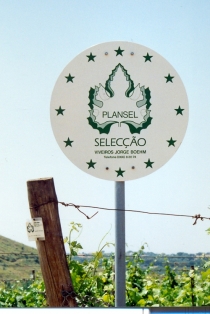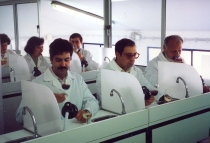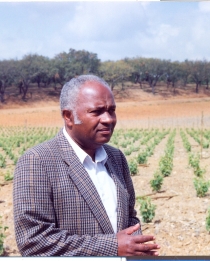Varietal Properties and terroir-specific behaviour
Measures
First, within the context of the PLANSEL selection programme, grapevine propagation material of selected clones was planted in various different environmental conditions on the farm, and wherever possible, on several different rootstocks. The grape yield of these plants (some 100 per clone/rootstock combination) was statistically studied for up to 10 years. The study focussed on grape production (mean, mean deviation, asymmetry) and analysed the results in the laboratory, with the analyses for polyphenols, acids, and alcohol content being conducted by the University of Évora. The grapes were microvinified and tested by experts at Mitra, University of Évora (Colaço do Rosário).
Later, all test results were summarized, and an attempt was made to describe the regional and temporal stability of the properties of the different clones using joint regression analysis (João Tiago Mexias and Jola Pinto of the Universidade Nova de Lisboa). All experiments led to applications in dossier form being submitted to CNEVV (Comissão Nacional para o Exame de Variedades de Videira), the national grapevine variety cloning inspection commission.
Finally, in 2000, eight experimental units were created at Lagoa, Montemor, Reguengos, Licírias, Dois Portos, Leiria, Castelo Rodrigues, Régua and São João de Pesqueira. The location of each was chosen based on geoclimatic considerations. Propagation material came primarily from recognised clones of the grapevine varieties Aragonez (French, Spanish and Portuguese clones) and Touriga Nacional (PLANSEL and RNSV) and was selected according to statistical criteria (with 50 plants in each repetition). Using the joint regression technique, the regional relevance of the various clones was researched. It was surprising then that with the final tranche of the EU funding programme, the Portuguese Ministry of Agriculture for the most part did not consider viticulture‑related projects, which meant that the plantations had been in vain and no terroir‑relevant statements on the differences between terroirs were possible.
Publications
- Production of quality propagation material for the renovation of Portuguese vineyards, Hans Jörg Böhm; Vida Rural No. 7/90 (1990)
- The future of the autochthonous grapevines of Portugal; PAMAF IED No. 2003. Hans Jörg Böhm, Teresa Roque, João Mota Barroso, João A. Araujo, Revista do agricultor No. 120/99 (1999)
- Improvement of wine quality through clonal breeding; Contribution to the OIV World Wine Congress; Comendador Colaço do Rosário, Prof. Antero Martins, Ing. Paulo Laureano, Ing. Teresa Roque, Hans Jörg Böhm; APH‑Folha Informativa No. 58, pages 1‑2 (July 1999)
- Certification of grapevine propagation material in Portugal Why are there different certified clones? Hans Jörg Böhm, João Mota Barroso, João Tiago Mexia, José Constantino Sequeira, Emanuel Castro T. Cardoso; Vida Rural, pages 14‑19; December 2002/January 2003
- Tradition and renovation of grapevine varieties in the Alentejo viticultural region Hans Jörg Böhm, Colaço do Rosario; OIV Congress, Mainz, Germany (1999)
- Trials to determine the properties of various Aragonez clones. Hans Jörg Böhm, Emanuel Castro T. Cardoso; First ISHS International Symposium on Grapevine Growing, Commerce and Research (Lisbon, 2003)
- Portugal: a grapevine gene centre of its own, Hans Jörg Böhm; VII ISHS International Symposium on Grapevine Physiology and Biotechnology; proceeding, Davis, California, USA (2004)
- Portugal has certified grapevine clones, Hans Jörg Böhm; Revista de Vinhos, pages 88‑93 (August 2002)
- Progress on the certification of grapevines in Portugal, Hans Jörg Böhm, Teresa Roque, Hélia Cardoso; Vida Rural, pages 22‑27 (June 2001)
- Official certification of grapevine clones in Portugal, Hans Jörg Böhm, Teresa Roque, Hélia Cardoso; Vida Rural, pages 24‑27 (May 2001)




